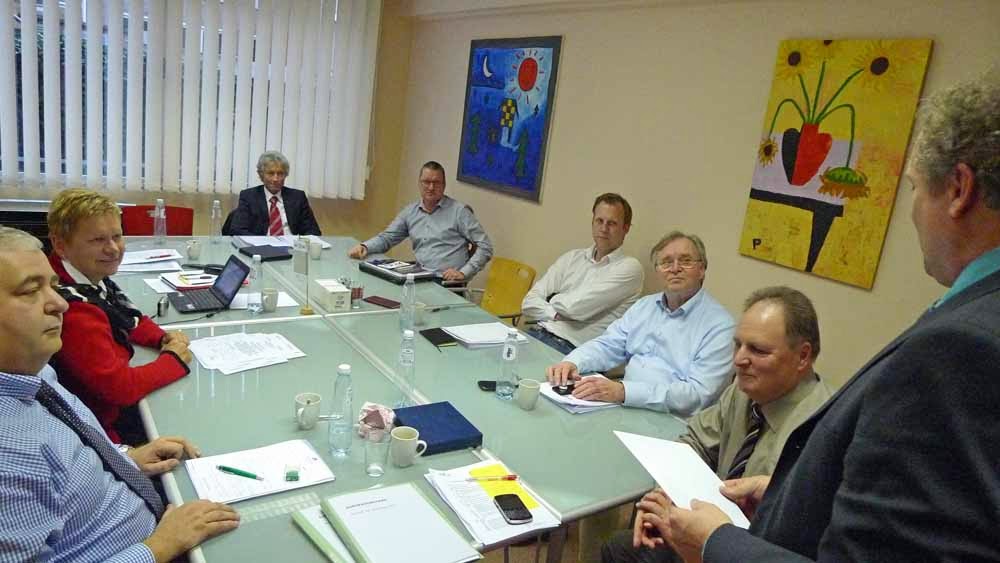The International Trade Action of the
WCL has a complicated history because of the diversity of its actors.
The 8 International Trade Federations (ITF's) - WFCW ( banking,
insurance and other private sector services) , WFEW ( education) ,
INFEDOP / EUROFEDOP (officials in public service) , WFIW (industrial
workers ) , WFCW (construction & wood) , IFTC ( textile workers )
, FEMTAA ( agriculture and food ) and FIOST (transport and
communication workers) had a life of their own with their own
statutes, world congress, world board etc. The finances came for the
most part of their European members. In some ITF's, mostly Belgian ,
Dutch and French trade unions paid high dues, in others also members
from Austria , Germany , Canada and Denmark .
On the other hand, the ITF's paid also
dues to the the WCL in proportion to the number of members. This
structural bond with WCL led to a certain degree of centralized
policy or should I say more euphemistically a policy of
coordination. The ITF's maintained a lot of autonomy and did not
always accept the common strategy of the WCL. You could say that
there was a certain kind of anarchy which was more or less supervised
by the WCL.
For example, the ITF's ignored the new
member policy of the WCL. While the WCL refused to allow the German Christian Trade union Confederation CGB and the Danish Trade Union Confederation KRIFA to the
WCL, members of these confederations were welcome at the WFIW, the
WFCW, the IFTC and EUROFEDOP. This meant that in this way, the WCL
International Trade Federations still guaranteed a certain trade
union pluralism in Europe. In the meantime both confederations
mentioned here were fiercely attacked by the social-democratic
oriented trade unions in their country.
In Germany, the mighty German trade union confederation DGB fed the rumor that
CGB members are not only conservative but would even have a Nazi
past. The attacks were also structural. IG Metall ( affiliated to the DGB) tried to get the
Christian Metal Trade Union CGM (affiliated to CGB) to its knees by challenging in court again
and again that they had no right to sign collective agreements in
companies like Volkswagen, Audi etc. At last the CGM got justice, but
at a high price because of the high costs of litigation in terms of
money and energy.
The Danish social democratic LO not
only portrayed the Danish Christian Trade Union Confederation KRIFA as a conservative trade union but
also as an anti – trade union because they would not recognize the
right to strike. Indeed, KRIFA does not consider the strike as a
weapon in the fight for better working conditions but that does not
mean that they deny other trade unions the right to strike . That 's
a nuance that was lost in the struggle for trade union monopoly by
the LO .
The Danish Social Democratic LO also
put pressure on the leadership of the Belgian ACV by pointing out
that admission of the Danish KRIFA into the WCL would affect the
position of the Belgium Christian Trade Union Confederation ACV in the European Trade Union ETUC. At a meeting of the
WCL European Section (October 1996) ACV chairman Willy Peirens, also
WCL president, vetoed the affiliation of KRIFA to the WCL because of
its anti-strike position. Meanwhile in its own country KRIFA had to
compete against the "pre-entry closed shop system" (“A
pre-entry closed shop is a form of union security agreement under
which the employer agrees to hire union members only, and employees
must remain members of the union at all times in order to remain
employed.”) that was
used by LO Denmark and through which members of KRIFA were excluded from
jobs.
The trade union monopoly of the LO Denmark is
mainly based on this principle of pre-entry closed shop, that dates
back to the early industrial era and is based on the idea that the
employer is by nature the enemy of his employees. The KRIFA premise and
that of other Christian unions does not agree with this idea. Employers
and employees in a company can indeed have opposing interests but ultimately
both have a common interest in the survival of the company. After
much social struggle this idea has become the heart for what we call
now "the Social Dialogue" After a lot of court precedents
in Denmark, KRIFA was upheld by the European Court of Human Rights
in Strassbourg, which ruled that the pre-entry closed shop is contrary
to Article 11 of the European Convention on Human Rights:
Article 11 – Freedom of assembly
and association
1. Everyone has the right to freedom
of peaceful assembly and to freedom of association with others,
including the right to form and to join trade unions for the
protection of his interests.
2. No restrictions shall be placed on the exercise of these
rights other than such as are prescribed by law and are necessary in
a democratic society in the interests of national security or public
safety, for the prevention of disorder or crime, for the protection
of health or morals or for the protection of the rights and freedoms
of others. This article shall not prevent the imposition of lawful
restrictions on the exercise of these rights by members of the armed
forces, of the police or of the administration of the State.( See: EUROPEAN COURT OF HUMAN RIGHTS , 11.1.2006 ,Press release issued by the Registrar , GRAND CHAMBERJUDGMENT SØRENSEN & RASMUSSEN v. DENMARK ).
However, the ruling of the European
Court did not end the conflict with the LO Denmark. Trade union members of LO Denmark continue to try to force members of KRIFA to leave their job by
bullying.

+BLOG.jpg)

Dear Piet
ReplyDeleteAgain you clear and objectively gives us a insight in the world of Trade Unionism. Yhank You for your contribution. Rolf Weber, Krifa, Denmark